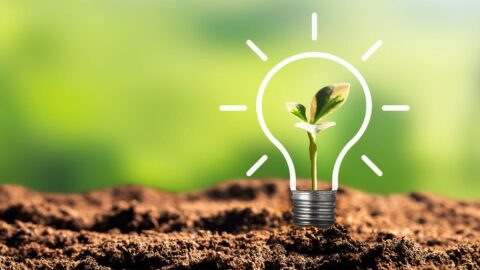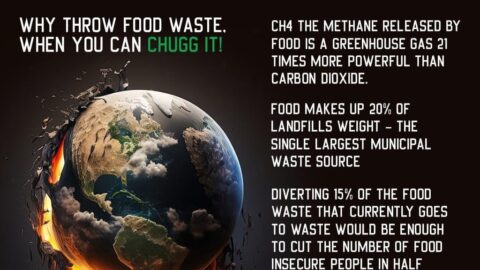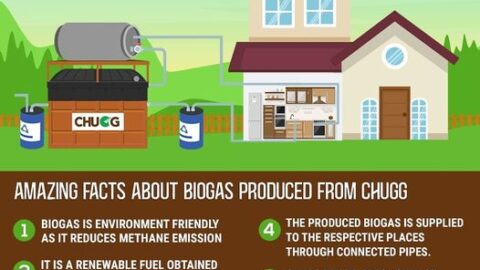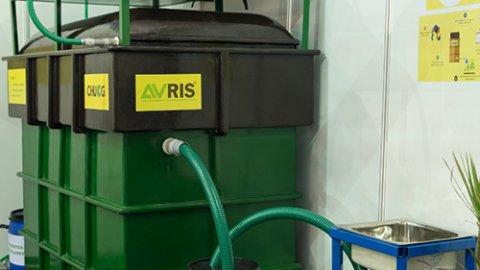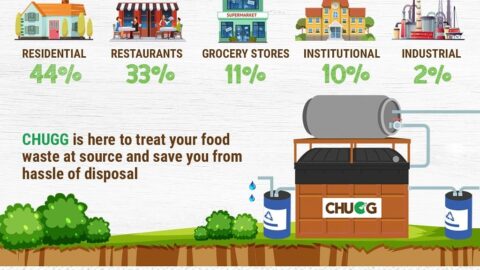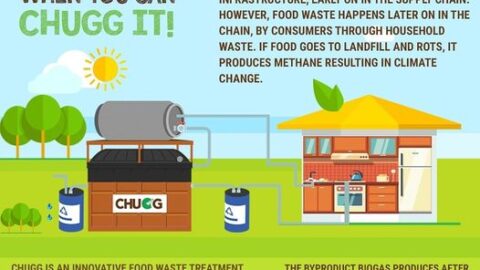There has been progressively more spotlight on decreasing the emanations of greenhouse gas substances all through the world. A vital rising innovation in such a manner is CHUGG- an innovative food waste treatment system that anaerobically digests landfill and organic waste, which makes a gas with a high methane content that we call biogas. This Biogas can be used for electricity, heating, and fuel for transport that can help us fighting or combat climate change through food waste.
Source of organic waste matter
Biodegradable wastes are universal and undiminishing: they are produced from numerous human, social, and economic exercises. Such wastes can be found in food waste from homes, eateries, shops, and food providers, animal husbandry, and manure, farming, crop development, and food production (like dairy); also, sewage slime from wastewater treatment, both at city and nearby community level. These wastes degrade to discharge methane however can be recycled using a CHUGG-food waste treatment system to create renewable energy either for neighborhood use or for conveyance into wider grids.
Is Biogas renewable energy?
Biogas is carbon neutral thus making it renewable energy and a viable solution to fight against climate change. The biogas is produced by the decomposition of different organic materials with microbes in an anaerobic climate, in other words, one that is without oxygen.
The raw materials used to produce Biogas are:
- Agricultural waste
- Manure
- Sewage sludge from municipal water treatment plants
- Food waste
When they break down, these materials produce CO2 and methane, a greenhouse gas with a global warming potential in excess of multiple times higher than CO2. The methane and the CO2 ingested during the development of the plants or contained in the materials are consequently reused and converted into valuable and clean energy. This biogas a carbon–neutral energy.
Uses of Biogas
- Complies with SWM-2016 rules: In many countries waste is badly managed that includes India too. Poor waste management is unsightly, damages the environment, impacts human health, and attracts flies and vermin. Improper waste disposal is an unsustainable waste management method. CHUGG- food waste treatment system in India offers a more sustainable waste management option, recovers resources and diverts them from landfill disposal, and uses less space than landfills. Therefore it complies with Solid waste management (SWM)- 2016 rules and helps with food waste management in India.
- Substitutes the use of fossil fuel: Globally, heat, and electricity are produced by coal, natural gas, and petroleum products. Carbon dioxide emission from the utilization of the energy thus created represent 25% of absolute anthropogenic GHG emanations Sustainable power got from biogas created from food waste, and organic materials substitute petroleum products as well as lessens carbon dioxide emanations by completing the carbon cycle.
- Reduces landfills: Though countries and cities are separately collecting the organic waste materials, landfills globally still account for 700 million tons of methane emissions annually. Extraction of landfill gas from both operating and closed landfills and redirection of organic waste to AD will prompt reduced discharges, usage of nutrients through digestate, and utilization of biogas to create energy.
- Substitutes LPG: Globally, an expected 1.6 million have suffered due to indoor air contamination. This is caused largely by the use of firewood, crop residues, dried animal dung, and crop waste as domestic fuel. Moreover, the utilization of wood is one of the main sources of deforestation, which thusly adds to the emission of greenhouse gas. Therefore using biogas as cooking fuel can mitigate indoor air pollution and abate deforestation.
- In the transport sector: Globally 95% of the vehicles use petroleum gas as fuel which contributes to 14% of greenhouse gas emissions. Utilization of biogas derived from organic waste material as fuel completes the carbon cycle rather than adding further fossil fuel/sequestered carbon into the atmosphere.
- In the agricultural sector: Farmers are increasingly worried about ensuring the protection of soil and the environment around their area. They are embracing sustainable cultivating practices to change to a carbon unbiased industry and to mitigate global warming. Biogas offers numerous chances for farmers in a viewpoint of circular economy and reduced GHG emissions. The biogas produced in the farm can be utilized to power the buildings with electricity/heat, therefore you get extra income by selling this green energy. The nutrient-rich digestate is a great substitute for synthetic fertilizers.
Thus biogas is a uniquely flexible form of energy generation. It can be used to generate baseload electricity, meet high demands, provide low-carbon heat, or can be even upgraded for use as a transport fuel. Thereby biogas production reduces the carbon footprint of organic waste materials and helps combat climate change and provides sustainable development.


